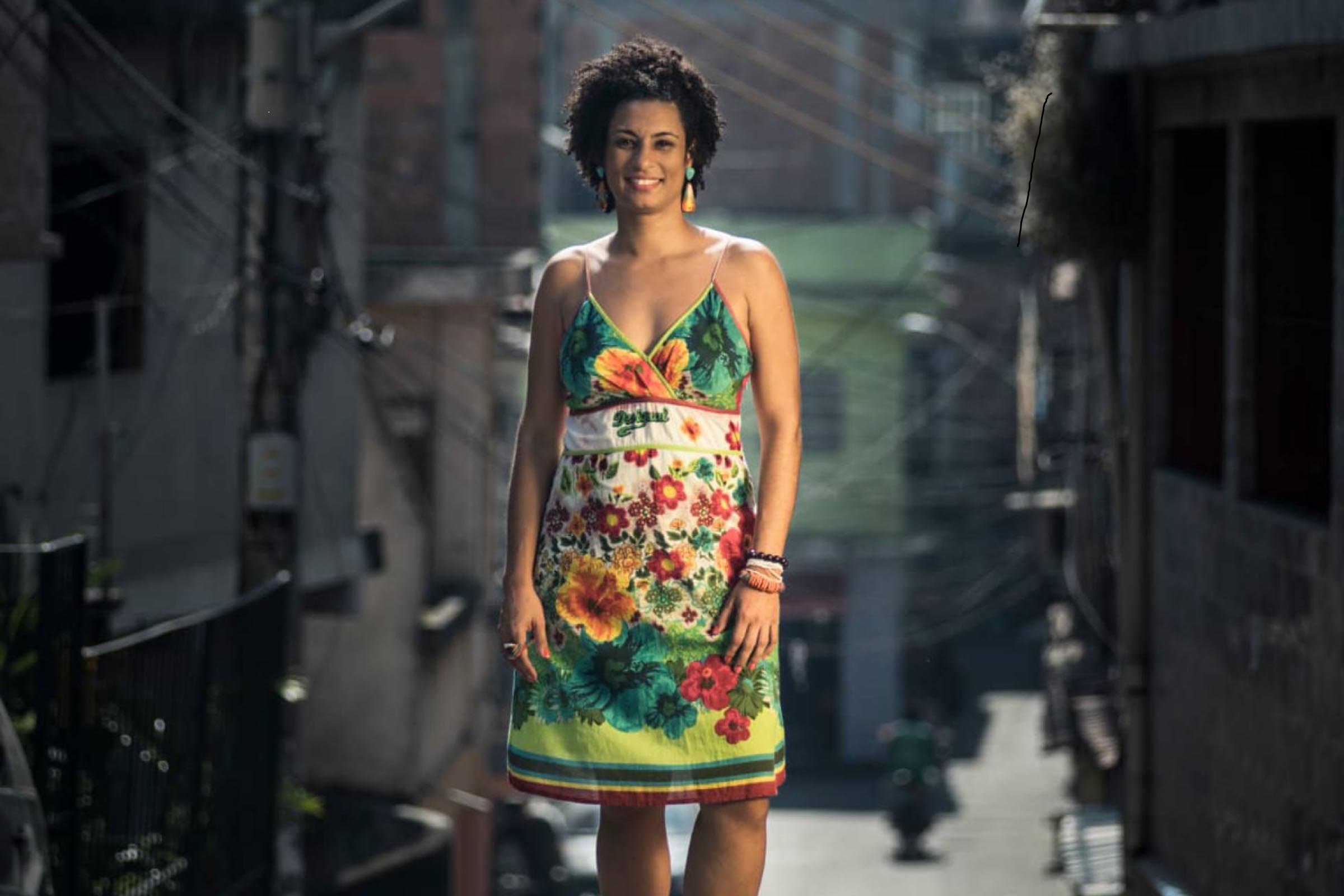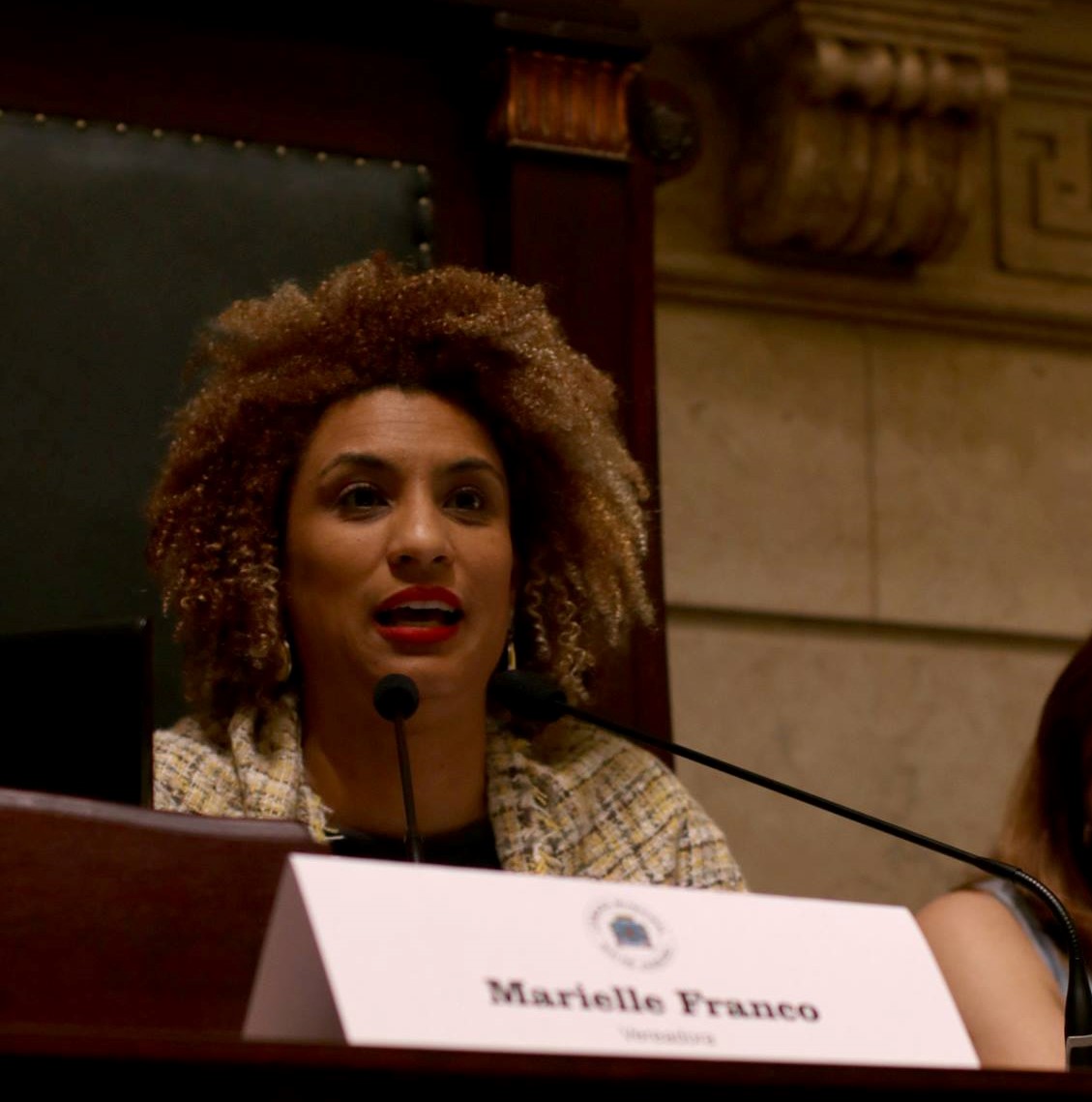
Clique aqui para Português
On March 24, 2024, the Brazilian Federal Police (PF) launched an operation resulting in the arrests of three suspects behind the March 14, 2018 murder of Rio de Janeiro Councilwoman Marielle Franco and her driver, Anderson Gomes. The accused are: Domingos Brazão, advisor to the Rio de Janeiro Auditory Court (TCE-RJ), named the mastermind behind the crime; Chiquinho Brazão, Domingos’ brother and a sitting Federal Congressman for Rio de Janeiro under the União Brasil Party, who has been accused of financing the assassination; and Rivaldo Barbosa, Rio de Janeiro’s former Chief of Civil Police, who helped plan the assassination and obstructed investigations.
That same day, The Intercept Brasil published a report stating that Marielle was killed so that then-City Councilman (now-Federal Congressman) Chiquinho Brazão could secure the approval of Municipal Bill 174/2016, also known as the Land Grab Bill. Largely impacting the city’s West Zone, the bill was under consideration in the Rio de Janeiro City Council at the time. According to the Federal Police, Marielle’s murder is linked to her advocacy for access to land by low-income citizens in line with Brazil’s constitutional recognition of the social function of land. Marielle was also against land grabs and the militias’ clandestine land allotments, demanding that public institutions such as the Land and Cartography Institute of the State of Rio de Janeiro (ITERJ) and Rio’s Public Defenders’ Land and Housing Nucleus (NUTH) take a leading role in investigating these land practices.
She Died Because She Believed in Land Rights and the Right to the Favela!
It has been six years of frustration and demands for an efficient and conclusive investigation to answer the question: who ordered the assassination of Marielle and Anderson, and why?
As city councilwoman, Marielle Franco catalyzed the debate on housing and land rights. During her short term, she spearheaded the collective effort to introduce the concept of the Right to the Favela. In 2017, her office brought together 300 people at the Maré Museum for the 1st Right to the Favela Summit. Several topics were discussed, including the right to housing and land.

The right to housing is enshrined in the Brazilian Constitution, specifically in Article Six, which establishes the social rights of all Brazilians. The right to adequate housing was established by the United Nations and encompasses several elements, such as access to urban services, suitable location, affordability, and security of tenure. Secure tenure concerns the right to remain in one’s place of residence and is closely related to land regularization policies.
Rio de Janeiro faces a historic housing deficit of about 500,000 homes despite being Brazil’s second-wealthiest state. This backdrop sets the stage for Bill 174/2016, introduced by then-Councilman Chiquinho Brazão, which relaxed requirements for land allotment regularization and irregular construction in neighborhoods with a strong presence of vigilante, off-duty police militias. While initially appearing to address a genuine demand from low-income residents in irregularly-occupied areas, the bill ultimately benefited militia activities. This is because militia groups saw this legalization as an incentive to escalate their promotion of clandestine real estate development.
Marielle took a public stance against the bill, arguing it would not provide residents of socioeconomically vulnerable areas with adequate housing, but rather exacerbate their vulnerability. Furthermore, the bill would ultimately produce medium- or high-income real estate ventures developed by militias—the primary beneficiaries of Chiquinho Brazão’s bill. Initially supported by City Hall during Mayor Marcelo Crivella’s administration, public pressure and media exposure linking the initiative to the militias forced Crivella to veto the bill. However, the veto was overturned by parliamentarians, resulting in the legalization of 149 neighborhoods that lacked proper planning.

Marielle and other opposition councilors denounced that the bill would favor land grabbing, urban expansion in areas meant for environmental conservation, and the construction and sale of irregular properties by militias, rather than the development and regularization of favelas. This illegal and mafia-like real estate chain does not operate in the shadows. Militia gangs offer these properties through real estate agencies, even offering the possibility of financing them by the militia itself. Eventually, the Rio de Janeiro Public Prosecutor’s Office filed a lawsuit resulting in the law being declared unconstitutional.
In addition to the environmental cost, these constructions do not comply with safety standards and put residents’ lives at risk. Unlike favelas—where houses are generally built over several years, in accordance with the needs of families, and by locals with experience in building on that terrain and topography—militia-run real estate developments are purely black market-driven, generating hastily-built units with dubious and inadequate materials, and precarious labor. Their last concern is resident safety. Besides the evident profit from the real estate market, militias also gain new regions for extortion through the creation of new neighborhoods, gated communities, and housing complexes.
According to the Federal Police investigation, the Maré councilwoman’s vote against the bill made Chiquinho Brazão deeply discontent. According to the investigation, this is what led Chiquinho and Domingos Brazão, along with the former chief of Civil Police, to orchestrate the assassination of Councilwoman Marielle Franco.
The Federal Police pointed to another fact confirming the link between Rio’s land mafia and Marielle Franco’s political femicide: the payment for the councilwoman’s gunmen would be made with land seized by the militia. In March 2019, the Federal Police arrested Military Police officers Ronnie Lessa and Élcio Queiroz, who were accused of executing Marielle and Anderson Gomes. According to the investigation, the payment for Marielle’s execution would be made through plots of land originating from land grabs in militia-controlled areas, which they reasonably expected to be legalized later.
Militias and Land Grabs Were the Central Reason for the Political Assassination of Marielle Franco
The actions of Rio’s militias are increasingly linked to land issues. According to a 2021 report by the Study Group on the New Illegalities (Geni/UFF) and the Metropolis Observatory at the Federal University of Rio de Janeiro’s Institute of Research and Urban and Regional Planning (IPPUR/UFRJ), real estate activities carried out by militia groups, whether legal or illegal, are becoming one of these criminal gangs’ main sources of income.
This brand of “militia urbanism” is practiced both through the appropriation of public housing, especially housing complexes under the Minha Casa Minha Vida federal program, and through the irregular construction of residential units. These constructions are then legalized by the government, infiltrated by militias.

According to researchers:
“In general terms, militia urbanism exploits the complicity of City Hall, bribery, coercion or threats of violence by inspectors, the infiltration of militia members into legislative bodies and positions of trust in the Executive Branch, in addition to the support, at various levels, from Civil and Military Police.”
Most of the irregular constructions in Rio de Janeiro that are later legalized by the government are located in areas dominated by militias.

These land regularization procedures are carried out through municipal legislation that establishes specific guidelines for land division in particular regions, making it easier to legalize real estate developments in areas plagued by militia activity. According to a report by newspaper O Globo, some councilors even misuse the designation of Areas of Special Social Interest, distorting its original purpose of ensuring housing rights for low-income families, to legalize constructions by militias.
The measures used by public authorities to legalize irregular real estate ventures reveal the extent of infiltration of Rio’s political class by militias. According to a report by the Right to Memory and Racial Justice Initiative, De Olho na ALERJ (a watchdog for the Rio de Janeiro State Legislative Assembly), between 2021 and 2024, 89% of legislative requests to regularize land for real estate development were concentrated in Rio’s West Zone, an area with a strong militia presence.
This also happens at the municipal level. According to a report by the Federal Police, Marielle’s actions during the legislative process behind Bill 174/2016 were the catalyst for her murder. This bill, authored by then-Councilman Chiquinho Brazão, aimed to legalize irregular areas in the regions of Vargem Grande, Vargem Pequena, Itanhangá, and Jacarepaguá. Marielle opposed the proposed bill, arguing that it would not benefit socioeconomically vulnerable populations but rather medium and high-income real estate developments controlled by militias. This stance conflicted with the interests of the Brazãos and the militias who supported their election, ultimately leading them to plan her murder.
We can now conclusively confirm that Marielle Franco was a victim of political femicide, motivated by her fight for the rights to housing, land, and the favela.
